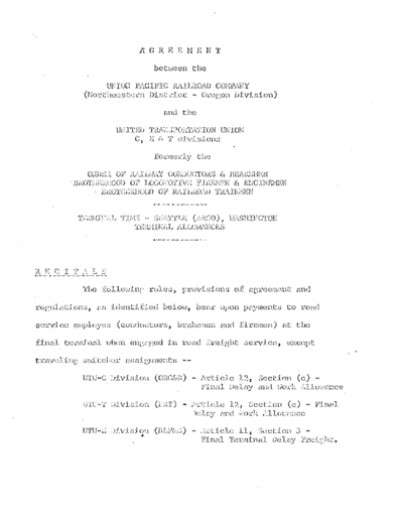FINAL DELAY- SEATTLE (ARGO)
| Description: AGREEMENT between the UNION PACIFIC RAILROAD COMPANY and the UNITED TRANSPORTATION UNION formerly the ORDER OF RAILWAY CONDUCTORS AND BRAKEMAN TERMINAL TIME – SEATTLE (ARGO) WASHINGTON Recitals The following rules, provisions of agreement and regulations, as identified below, bear upon payments to service employees (conductors, brakemen, and firemen) at the final terminal when engaged in road freight service except traveling switcher assignments – UTU-C Division (ORC&B) – Article 12 Section (c) - Final Delay and Work Allowance UTU-T Division (BRT) – Article 12, Section (c) – Final Delay and Work Allowance UTU-E Division (BLF&E) – Article 11, Section 3 – Final Terminal Delay Freight By an agreement dated July 1, 1969, effective July 15, 1969, the switching district at Seattle (Argo), Washington was extended eastward from mile post 178 for a distance of three miles to mile post 175. Prior to the extension of the switching district eastward, final terminal delay time to road service employee's commenced after train had reached mile post 178, the location of the yard limit board and the extent of the Seattle (Argo) switching limits. To give effect to rules, provisions of agreement and existing practices and understandings reached in the conference discussions at Seattle, Washington on May 28, 1969 - - IT IS AGREED: Section 1. In the application of Section (c) of Article 12 in the Schedule Agreements of May 1, 1945 (conductors and brakemen) and Section 3 of Article 11 in the Schedule Agreement of July 1, 1946 (firemen/helpers), final terminal delay time for westward freight trains arriving Seattle (Argo), Washington shall commence and be computed from mile post 175. Section 2. Crews of road freight train service assignments may be required to make either a straight pickup or a straight setout of cars but not both to a single track, including the yarding and securement of their trains or portion of such trains on or from a single track in the new yard to be constructed and located between mile posts 177 and 176, in which event such road crews shall be paid the actual time consumed, with a minimum of one hour, at the pro rata rate applicable to the class of service performed in addition to all other time earned on the trip and without deduction for the time so consumed. NOTE 1. In the application of this Section 2, a stop by the train to permit yard crews to add or remove cars from the train or where both road and yard crews assist in the picking up or setting out of cars shall be regarded as a pickup or setout of cars within the intent and meaning of this rule. NOTE 2. Time consumed in the application of Section 2 shall commence at the time train stops at point where pickup and/or setout is to be made and will end when train is coupled together. NOTE 3. A straight pickup or setout of cars by a road freight crew as referred to in Section 2 of this rule shall mean a car or cars coupled together and first out which are to be either picked up or set out from or to a single track, but nothing herein shall be construed so as to prevent a yard crew, when adding cars to or removing cars from a road freight train, from either securing or placing such cars on more than a single track. Section 3. Notwithstanding the provisions of Section 1 of this agreement, the road mileage for road freight train service assignments which are bulletined to operate through from Portland (Albina), Oregon to Seattle (Argo), Washington and vice versa shall be 179 miles. Section 4. This agreement shall be effective July 15, 1969 and thereafter subject to change, modification or amendment as provided in the Railway Labor Act, as amended. Dated at Portland, Oregon this 1st day of July, 1969. UNITED TRANSPORTATION UNION: UNION PACIFIC RAILROAD COMPANY: |
